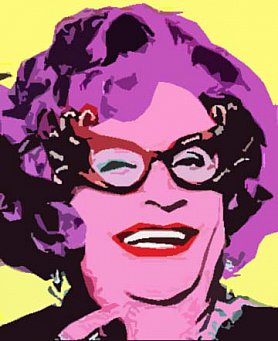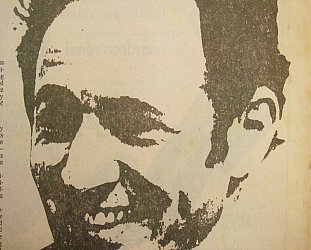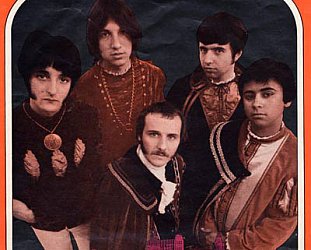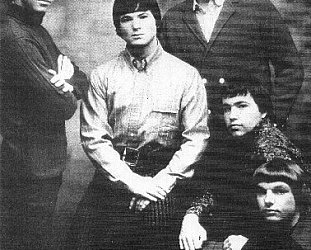Graham Reid | | 5 min read
Sandy Stone: Dear Beryl

At his first Pan-Australia Dada exhibition, Barry Humphries had packages printed up bearing the name Platitox, which allegedly contained a poison to put in creeks to kill the platypus, that much-loved, much-protected and playful native animal.
“So why have an exhibit which offers a pesticide to destroy these animals? Because everything was in its place in Australia,” said Humphries, who later told Who’s Who one of his hobbies was inventing his own Australia.
“On the package in small print it said it was also rather good for Aboriginals. Aboriginals didn’t exist; in a way one was lead to believe that they lived a long way away and were dying out anyway. Which was terribly sad . . . but there it was.
“This was all part of the tyranny of niceness and order. I didn’t want to overthrow order, I just instinctively wanted to give it a bit of a jolt so that people could see it.”
The year was 1952 and Humphries was already offending Australian sensibilities.
Here was a man who would bury a roast chicken in a rubbish bin then, dressed as a tramp, come along and rummage through until he found it. As people averted their eyes suddenly “the tramp” would strike it lucky.
This too was a man who would empty a Russian salad into a sick bag on an aircraft, feign vomiting, then eat the salad from the bag.
“If an air hostess sees you,” he says, “it can produce what I call a Chain Chunder. Five minutes later the pilot is throwing up.”
For such outrageous pranks -- and having women friends dress in school uniform so he could grab them on the streets of Melbourne and engage in very deep tongue kissing before horrified middle-class shoppers -- Humphries was acclaimed by the art critic Robert Hughes in The Art of Australia (1966) as “the only Australian who ever understood the Dada principle of provocation”.
Humphries has enjoyed a lifetime of provocation, whether it be in a thoroughly nice but venomous way in the guise of Edna (late Dame Edna) Everage or in the more grossly priapic persona of Sir Les Patterson, Australia’s cultural attache to Britain (“a chauvinistic, beer swilling drunk without any sensitivity,” according to the Australian Minister for Tourism in 1987).
Yet for his enemies and targets (often the same thing) the most irritating feature of Humphries is that he is gifted and part of a long, mostly English, tradition of intellectual dandyism. As with Oscar Wilde, Humphries is a man whose wit provokes and challenges as much as it entertains. He walks that tightrope between vicious satirising and knee-slapping laughter.
Dame Edna -- a character psychologists have dissected with relish and one which originally allowed Humphries a peculiar vengeance on his own mother -- looked to have run her course by the early Nineties. Although her fame ascended, she was less wantonly cruel and her television series, hilarious though it was in places, was a mere shadow of her former outrage.
Sir Les still provoked howls of self-conscious laughter simply by being a phlegm-flecked drunk (“but I’m not full yet”) and chillingly familiar.
Humphries’ characters grew as their creator moved from the Dada events of the Fifties in middle-class Melbourne and on to the world stage, and Humphries recorded his progress thoroughly.
He has written numerous books (including Dame Edna’s autobiography, and his own), made albums -- even as far back as 1951 he was making private recordings on tinny tape recorders for the amusement of his undergraduate friends.
Many of those early pieces were thought lost or consigned to a mere listing in books noting his rare recordings.
However in the early Nineties, Raven Records -- responsible for a fascinating Velvet Underground box set and compilations of great integrity -- released two Humphries’ sets; Moonee Ponds Muse Volume One and Dada Days (Moonee Ponds Muse Volume Two).
For Humphries aficionados these are essential discs and allow you to hear the growth of an artists self-awareness. For those with only passing interest in Dame Edna on the telly they are probably considerably less so.
Volume One opens with The Edna Suite, a collection of songs and monologues (“the Melbourne of my childhood was a fine Rexona town, its smile bright with Kolynos . . .”)
Included are True British Spunk (banned by the BBC) and Edna’s hymn extolling the virtues of Australia. Well, sort of, in a backhanded way.
The two standouts however are Sandy Agonistes and Dear Beryl by the Sandy Stone character: the first is a long litany of stream-of-consciousness recollections of a time past drawn from advertisements (“time for a Capstan, they’re blended better”) and almost forgotten radio days (“3KZ, the brighter broadcasting station”); the second a witheringly accurate and beautifully observed letter to his wife Beryl “in the old country” recounting mundane events back home in the suburbs (“yesterday I had a tinkle from Nora Manley . . . she asks to be remembered”).
As Sandy Stone -- a deceased character who inhabits the world of his youth -- tells you of a time long gone you are reminded of how Clive James described the character’s imagistic precision” Ezra Pound with the lights off.”
Sandy was a character which -- unlike Dame Edna and Sir Les -- Humphries had a genuine affection for, and it is evident in the softness of the delivery, the gentleness of the persona.
The Dada Days disc opens with distinctly low-fi student recordings from the very early Fifties. They are rather too self-conscious and forced by today’s more sophisticated standards.
Jim and Jim however anticipates the mindless colloquialisms of conversation that our own G’day Mate by the Ponsonby DCs skewered with equal enjoyment. Here too is The Migrant Hostess, a maliciously uncomfortable Edna piece from 1958 in which the lady offers a room in her home for “nice” migrants (no foreigners allowed, of course).
Sir Les also gets three pieces, one being a sentimental song to My Old Lady (“there’s a little old sheila waiting for me . . .no matter how I treat the poor old cow, my dinner’s always in the oven”) and Barry McKenzie weighs in with Earl’s Court Blues and My Little One-Eyed Trouser Snake, both of which would have been much funnier and outrageous at the time.
Although much of what is on these discs has been overtaken by later developments of the character and a more refined, cruel Humphries humour in some cases, they stand as fascinating references in the early career of on the 20th century’s greatest wits.
And in Sandy Stone a genuinely beautiful character who has been overshadowed by the more garish creatures of Humphries’ creation.
In his hilarious and acute study of Humphries, Dame Edna and the Rise of Western Civilisation, John Lahr concludes by saying that Edna takes the audience to the frontiers of the marvellous.
The same is broadly true of Humphries himself and if the evidence isn’t always on these two discs of juvenilia, it is certainly in Lahr’s marvellous book.
This month -- February 2009 -- Dr John Barry Humphries AO, CBE is 75.
Happy birthday Bazza. And thanks







post a comment